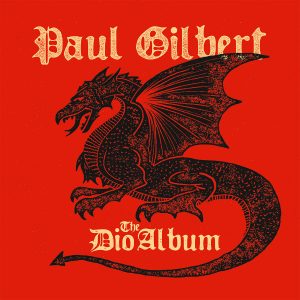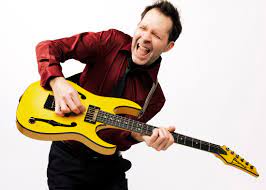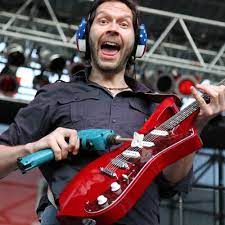HIT CHANNEL EXCLUSIVE INTERVIEW: February 2023. We had the great honor to talk with one of the best guitarists of our time: Paul Gilbert. Since the late ‘90s, he has a very successful solo career and has also been a member of Mr. Big and Racer X. Paul just released “The Dio Album”, an instrumental tribute album to Ronnie James Dio. Read below the very interesting things he told us:
 How did you come up with the idea to make a Dio tribute album?
How did you come up with the idea to make a Dio tribute album?
Oh, let’s see: Well, I love the music. I love Dio as a solo artist, I love what he did with Black Sabbath, I love what he did with Rainbow. I ‘ve also been trying to improve my guitar playing and my overall musicianship by learning vocal lines. I ’ve been exploring all kinds of different singers in trying to learn what a singer does and then putting it on my guitar. Actually, I made a list of singers that I want to learn and the first singer that I wrote down was Ronnie James Dio. So, I thought that’s how I am gonna start (laughs). Also, besides the vocal lines, the guitar parts were so much fun. You know, playing the Blackmore parts, the Tony Iommi stuff and the Vivian Campbell (Dio, Dep Leppard) parts, that was just a blast. I put bass on it too, so playing Geezer Butler parts -oh my goodness!- that was so much fun; Jimmy Bain (Dio) is fantastic. So, everything about it was a pleasure.
How challenging was it for you to play Dio’s vocal lines on guitar?
I’ve been working on it for a while, so that was a thing. It gave me some confidence. The main one, that I really spent time on was “Long Live Rock ‘n’ Rock” because the melody in the verse: that “tou-rou-paaa tou-rou-tou/ tou-rou-pa tou-rou (ed: from this point he starts singing like parts of melody are missing or have been edited out) …tou-rou-pa… pa-pa-WRRRRAA”. I was using that for a guitar lesson for my students and if you play it on a piano: (Ed: he sings softly) “ta-ta-ta ta-ta-ta/ ta-ta-tout”, it would lose the life. You know, it wouldn’t be the same because it’s all that sliding, there are just things that a voice has, that would be very difficult to copy with a piano. I think guitar is maybe like halfway between, but if work at it, you can get closer and closer to the vocal. So, that’s what I wanted. I wanted to have that as my goal and try to push myself to get more and more of that life that the singer had breathed into the melody.
You ‘ve said in an old interview that Eddie Van Halen had played you a track with Sammy Hagar’s vocal lines played on guitar. Did you recall that event before deciding to make “The Dio Album”?
That was an amazing thing; I’m glad you know about that. I mean, I only heard it once, so he was there at his studio and I don’t have recordings. It’s only in my memory, but I just thought it sounded great when he did that. Of course, Joe Satriani, Jeff Beck, Peter Frampton. I ‘m not the first one to do this. There are other guitar players that they have done a great job playing vocal melodies, but I think when you try to do that, there is more than one way to do it. So, I think every guitar player would find their own way to get closer to a vocal. If you gave Jeff Beck a melody, he is gonna sound different than the way Joe Satriani is gonna sound and he is gonna be different than mine. So, it’s just another way to bring your own soul into it and also to get some of the soul of the singers. It’s a meeting of souls.
 Revisiting the Dio songs after such a long time, what did it impress you the most?
Revisiting the Dio songs after such a long time, what did it impress you the most?
I played the vocal melodies, but I also played the rhythm guitar parts, I played the bass, I had to recreate the keyboard parts. I didn’t want to play keyboards on it, I wanted to try to do with guitar, so a lot of those production things were a nice challenge as well. For example, one of the songs, “Don’t Talk to Strangers”, it starts with a whisper. That’s the first thing Dio does. He whispers “Don’t Talk to Strangers” and I thought how I can get a whisper out of my guitar. I had two distortion pedals because I needed a lot of hiss and I put that into a wah-wah pedal and the wah-wah pedal gonna shape like “wah-wah/wah-haw” (ed: he sounds quite similar to Donald Duck’s voice). So, that way I could get the sound of the whisper. In the beginning of “Holy Diver” there is a whole synthesizer intro with a keyboard and I thought: “How I can do this?” I had a bass guitar and I wired it into a delay pedal, I put the volume up and made like a swell. I did the same with the guitar notes to form chords. The whole thing that sounds like a keyboard intro, I did it all with guitar. Those kinds of things: “How to get these sounds that the guitar doesn’t normally do?” So, I really tried to reproduce the songs the way they were. I didn’t want to change them too much. Probably the thing that I changed the most, would be the guitar solos and in those sometimes I will go: “OK, in this part Ritchie Blackmore is just ripping. I’ll rip too, but I ‘ll do it my way”.
Listening to “The Dio Album”, I really appreciated your rhythm guitar parts in songs like “Heaven and Hell”. They are extremely solid. Do you agree with this?
“Heaven and Hell” is a long song and there are almost like different songs inside of it, because there is the main groove in the start: “tan ta-ra-ra tan” but the end of it is twice as fast: “tou-rou tou-rou tou-rou” and at the very end of it there is this ancient folk, medieval guitar part. So, within one song there are so many different emotions. The nice thing about that one is that there is so much space for the vocals, because in the verse, the guitar has stopped playing; it’s just bass and drums and there is all this room. In a way, playing the vocal line you really have to do a good job, because you can’t hide behind the guitar (laughs). But it’s such a good melody. When you play those melodies, the notes are the same notes that you ‘d find in a blues song. That’s the interesting thing. Even though, this is heavy metal and of course Black Sabbath started as a blues band. So, when you play the pentatonic scale, it’s the same notes that everyone is using if they are playing a BB King song. There are other elements, a couple of the chords are a little different, but I think the vocal part is probably the most bluesy part. Even though everybody thinks of Dio as metal, a lot of his style comes from the way you hear some of the blues guitar players. To me, because I like this style of guitar, it’s wonderful to learn these things that Ronnie did.
Is there still room for experimentation in Dio songs or the original compositions are so perfect that you can’t touch them?
Oh, it’s hard to compete with those songs; the writing is so good. That’s one of the funny things about doing a cover album: I don’t have to work as a writer. But it is inspiring. I learned a lot as a bass player, because in a way bass is almost like a little song in itself. I was always surprised, but I know the guitar part and I have an idea: “Well, maybe the bass is kind of the same, just an octave lower” and then I would listen to the bass part and I would go: “No, it’s not the same; it’s really different” and doing all these unexpected things and they are all cool. One of the biggest surprises was in “Man on the Silver Mountain” and the bass part was almost like a disco part, because it’s going like: “TA-TA-TA-TA TA-RA-RAP/ PA-PA PA-RA-RAP/ PA-PA PA-RA-RAP/ PAP”. It sounds like it could be in a funk disco song, but it totally works. It sounds good. Now, on my own songs when I’ve playing the bass, I try that and I go: “This is a great bass part. I haven’t used that one I learned from ‘Man on the Silver Mountain’”. Also, Geezer Butler on the Black Sabbath stuff, he would almost always choose the middle octave and not the low octave, which was so surprising to me. I thought: “If it’s metal, you are gonna play the lowest note you can, because that’s more heavy”, but not Geezer. He would always play the middle note and in the whole “Heaven and Hell”, he could be playing the low (ed: with a heavy voice): “DA DA-RA-RA”, the low E you got it, but he doesn’t do it; he plays the middle E all the time. I’m not sure why, other than when I play it it feels like: “Yeah, there is a better choice” but I would never have thought of that. That was a big impression: It was like the bass players are always smarter than me (laughs). They always have better ideas.
 Do you think that “The Dio Album” is also a good opportunity for heavy metal fans to become more familiar with instrumental albums?
Do you think that “The Dio Album” is also a good opportunity for heavy metal fans to become more familiar with instrumental albums?
Ah! Yes, I think it’s nice where we give a chance to the guitar. I love singing and I love singers and to be able to step into that world with an instrument that I play a lot better than what I have as my voice (laughs), this is why I enjoyed so much. So, I hope the people can feel some of that enjoyment, because I loved doing it, but if I tried to sing the same thing with my voice, it’s not the right tool. Ronnie had the right tool, but I don’t. So, in a way, it allows me to get into that place to open that door which I couldn’t open with my own voice. In a way, what I hope opens up is for other guitar players, the other people who are frustrated and think: “Ah, I wish I can sing, but I can’t”, you know, you can do it with an instrument. Maybe you can’t do it with a guitar, but I think guitar is really good for it: You get the high notes, you still can get a lot of expression and anytime you play a melody you can be better at it.
Are there any touring plans for “The Dio Album”?
Yeah, I think if I do, I ‘ll have to find a heavy metal rhythm guitar player because it would be very difficult to have both of these parts just on one instrument. With the way these songs are arranged, I would need to have more guitar players on stage than just me, which might be alright.
But you have many good students.
Aaah, it’s true. I should probably teach them more rhythms guitar parts. Most of my students, we didn’t work on the solos as a lot.
In my opinion, “Professorship at the Leningrad Conservatory” from “Werewolves of Portland” (2021) is one of the best song titles of all time. Please tell us everything we should know about this song.
(Laughs) During the Covid lockdown I was thinking a lot about Shostakovich, the classical composer. I really love his Fifth Symphony and when I would read about his life, he had a very dramatic life: He lived in Russia at a time when there were revolutions going on and wars and it was a very difficult time to be alive and he is a musician. Suddenly, I find myself, a musician, in a time -maybe is not as difficult as that- that certainly is more difficult than I ‘ve ever experienced, so I was curious how Shostakovich handled it and in reading about him, I saw that he had a professorship at the Leningrad Conservatory and that struck me as an interesting phrase. Actually, I can’t remember what they were, but I wrote lyrics about it and those helped me to form the melody. That was the story of that one.
 Is it intriguing for you to come up with titles for instrumental pieces?
Is it intriguing for you to come up with titles for instrumental pieces?
A lot of time for an instrumental piece, it’s much easier to have a vocal melody and it’s easier to write a vocal melody if you have lyrics. So, it gives you something to work with which is different than your scale shapes. Because if I just pick up a guitar, I tend to go: “OK, I know the scale”, so I go: “dada dada/dada dada”, you start playing through the scale and something is hard to imagine beyond that. But when you have words, it uses a different part of the brain. I start to think: “How can I fit phrases with notes?” and then what chords could I put behind it and it tends to just feel more like a song. That’s the process that always turns out well.
What do you try to achieve musically with your slide playing?
With slide playing again, there are different styles of slide playing and I tend to copy singers, I haven’t listened to slide guitar players that much. I love Johnny Winter, I ‘ve heard “Free Bird” by Lynyrd Skynyrd, but I haven’t really tried to copy the guitar licks. Instead, I would learn Janis Joplin’s “Mercedes Benz” or “Some Kind of Wonderful” by Grand Funk and learn those vocal lines and that has been really helpful to me: Again, to copy singers. The good news is once I start getting the phrases, you realise: “Oh, that’s the same phrase I learned in this song”. It’s almost like when you learn a language, if you learn the basic words, it’s very useful: They happen everyday. At first, it’s hard to make it, it seems to get a little easier as it goes.
How much did the coronavirus disease affect your plans?
I start to do things more by myself. Because before that, I was really excited about trying to play live in the studio with a lot of musicians and then with the lockdowns, I thought: “OK, how can I do this with either only myself or just an engineer?” That actually got me to play drums again. I hadn’t played drums for a long time and that was fun. I love doing that (laughs). So, yes, I became a drummer again and maybe I played bass more and I hope someday to have that experience of playing with other people more, but at the moment, it pushes me towards doing more on my own.
 Why aren’t there any studio version of “Screamin’ Blues O’ Mania”?
Why aren’t there any studio version of “Screamin’ Blues O’ Mania”?
The original came out at the end of an instructional video (ed: released in 1989), I think and then there was a sound page in a guitar magazine. I had the multi-track for that on tape but it got destroyed (laughs). It’s boring, it’s not an exciting story. Yeah, I mean, there is a lot of music that I’ve done. It’s nice that you know that one and actually I remember some of that, the riff: “TAA da-ka-ta-ta/ TAA da-ka-ta-ta beeeodroup/ ba-da-ba-da ba-dap/ ba-da-pap/ ba-rep/ ba-pa-ra-pap/ ba-dou-ka barent / da-dou-ka pound”. I try to think what influenced that. It’s probably Pat Travers, because at that time I was trying to just build more than like the Yngwie stuff. Because I was really in the Yngwie for a while and I loved it and I still do, but I wanted to improve my blues playing, but I didn’t have any blues records, so the only record that I had that was a little bit bluesy was Pat Travers, “Go for What You Know” (1979) and I’m still learning some of that. What I learned from that is start to use it to build a song and that was one of them.
Were you surprised when Mr. Big’s “To Be with You” single reached #1 on Billboard charts in 1992?
I was both surprised and happy. I think it felt like it was out of my hands; like there was something that I had no control over. What I have control over, is like the C# minor chord (laughs). Eric (ed: Martin -vocals) wrote the song and he had a demo of it, but when I heard it I was the one that sold it to the band: “Guys, listen to the song that Eric has”, because Eric wasn’t that confident about; he thought that we wanted to be only a rock band: “They probably don’t wanna do an acoustic song” but when I heard it, I told to the other guys: “You gotta hear the song Eric did”. So, I was kind of salesman for the song and then it didn’t take much; everybody did really love it immediately and of course the other world responded well.
What is like to be a rock star in Japan?
In early ‘90s was the time when we actually had to hide (laughs). You know, you couldn’t go outside because people were surrounding the hotel room. Again, as a musician, you hope for success. So, that was the good part, but it was weird not be able to go outside. I remember we would get home and I could very easily go outside; nobody cared who I was while I was living in Las Vegas. So, it was sort of good to go between those two things: To experience a little bit of fame and also to experience the whole fame is gone and everybody is treating you as a totally normal person. So, I can compare the two and I think it would be much harder if you are just famous all the time, everywhere. That would be a little harder to deal with, but that wasn’t the case. It was one place that we go for a month and they do like: “Wow!” and then we go back to being normal.
 I’ m a fan of yours for one extra reason: because you love Frank Marino from Mahogany Rush. I’ve done three interviews with him (in 2012 , 2014 and 2019 -click on the year to read them). How much impact did his music have on you?
I’ m a fan of yours for one extra reason: because you love Frank Marino from Mahogany Rush. I’ve done three interviews with him (in 2012 , 2014 and 2019 -click on the year to read them). How much impact did his music have on you?
Oh, Frank Marino had a lot of impact. The “Live” (ed: by Mahogany Rush -1978) album, I was listening to it all the time. There was a concert called California Jam II (ed: 1978) and Frank played on that. That was the first time I heard him. He played “Purple Haze” and he was on TV and it was amazing. So, I just listened to that recording, I made a cassette recording of it and also the “Live” album and “Tales of the Unexpected” (1979), which half of that album is live. In a way, Frank took a song like “Johnny B. Goode” (Chuck Berry), which is a rock ‘n’ roll song from the ‘50s. A lot of people covered “Johnny B. Goode”: Jimi Hendrix, Johnny Winter, Judas Priest did “Johnny B. Goode”. But when Frank Marino did “Johnny B. Goode”, it was so much energy in it. He was playing such crazy guitar in it, so it was cool to see how he could change the song and make it his own in that style, so that was very inspiring.
One of my favourite Youtube videos ever is you playing Johnny Cash’s “You Are My Sunshine” and “Blue Train” at Guitar Center. Is humor an important part of your life?
There is a movie called “Spinal Tap” (1984), you may know about, a very funny movie about heavy metal musicians and even before that came out, I could tell that there is something kind of funny about heavy metal sometimes. I still love it but when you get upon stage and you are just like (ed: he makes a pompous voice) : “I’m the most powerful person in the world”. Sometimes you feel like that and sometimes it’s just like: “I just feel ridiculous” (laughs). So, when “Spinal Tap” came out, I think everybody who is a heavy metal musician had to make their peace for that movie. Again, I think those ideas can both be true: Sometimes when you play the music, it means exactly what it means and you do feel like the most powerful person in the world and it’s OK and it’s wonderful. And at other times, it just turns out to being ridiculous. I am gonna put my normal clothes and make lunch for my son. Both those parts of the personality can be real.
 Did you enjoy the 2007 G3 tour with John Petrucci and Joe Satriani?
Did you enjoy the 2007 G3 tour with John Petrucci and Joe Satriani?
Oh, of course. That was amazing. I learned a lot. I learned about melody because Joe is just a master of that. In a way, “The Dio Album” goes back to that tour where I was watching Joe basically playing like a singer. He is playing his own songs, but he is playing what a singer would sing on his guitar. Also, that tour taught me how to jam because every night we had a jam on just simple songs like “Goin’ Down” (Don Nix) and at first I thought: “Oh, the song is so simple. Maybe this is gonna be boring”, but it was always exciting, because we would listen to each other and we had a kind of musical conversation and it made me realize how cool it was, having just a simple song structure and then that allows you to really explore and communicate and to be in a moment. So, that was wonderful.
Jeff Beck recently passed away and you have brilliantly covered “El Becko” and “Heart Full of Soul” (The Yardbirds). Would you like to tell us a few words about his influence on you?
Oh, man! Jeff was amazing in how he was able to sound so different: Like he had one style in the ‘60s and in ‘70s he had a different and as decades went on, he kept growing and changing and to me that’s so cool. There are players who have found their one sound and it’s great and they keep it and that’s nice too, but it’s pretty rare to find somebody who goes like: “Oh, I can do this, but what else is there?” So, he seemed like a really curious musician and he had the ability to bring that curiosity to life.
A huge “THANK YOU” to Mr. Paul Gilbert for his time. I should also thank Lauren Schuller for her valuable help.
Official Paul Gilbert website: http://www.paulgilbert.com
Official Paul Gilbert Facebook page: https://www.facebook.com/paulgilbertmusic

